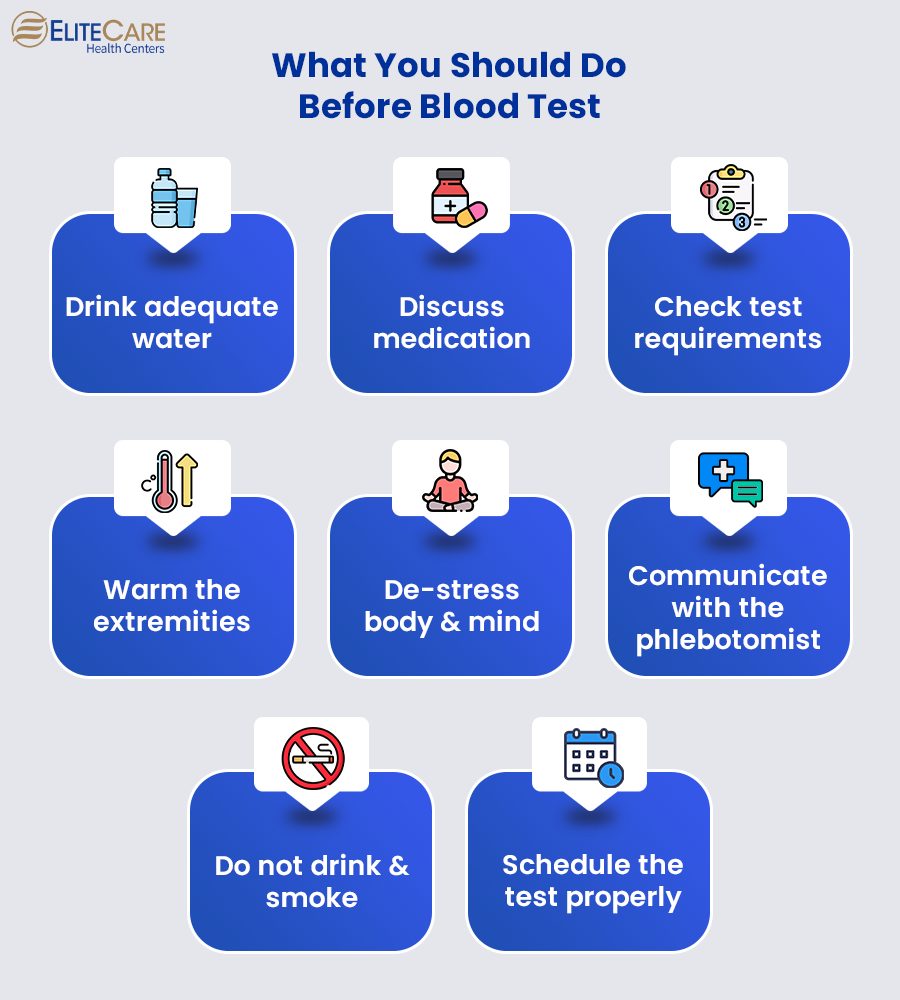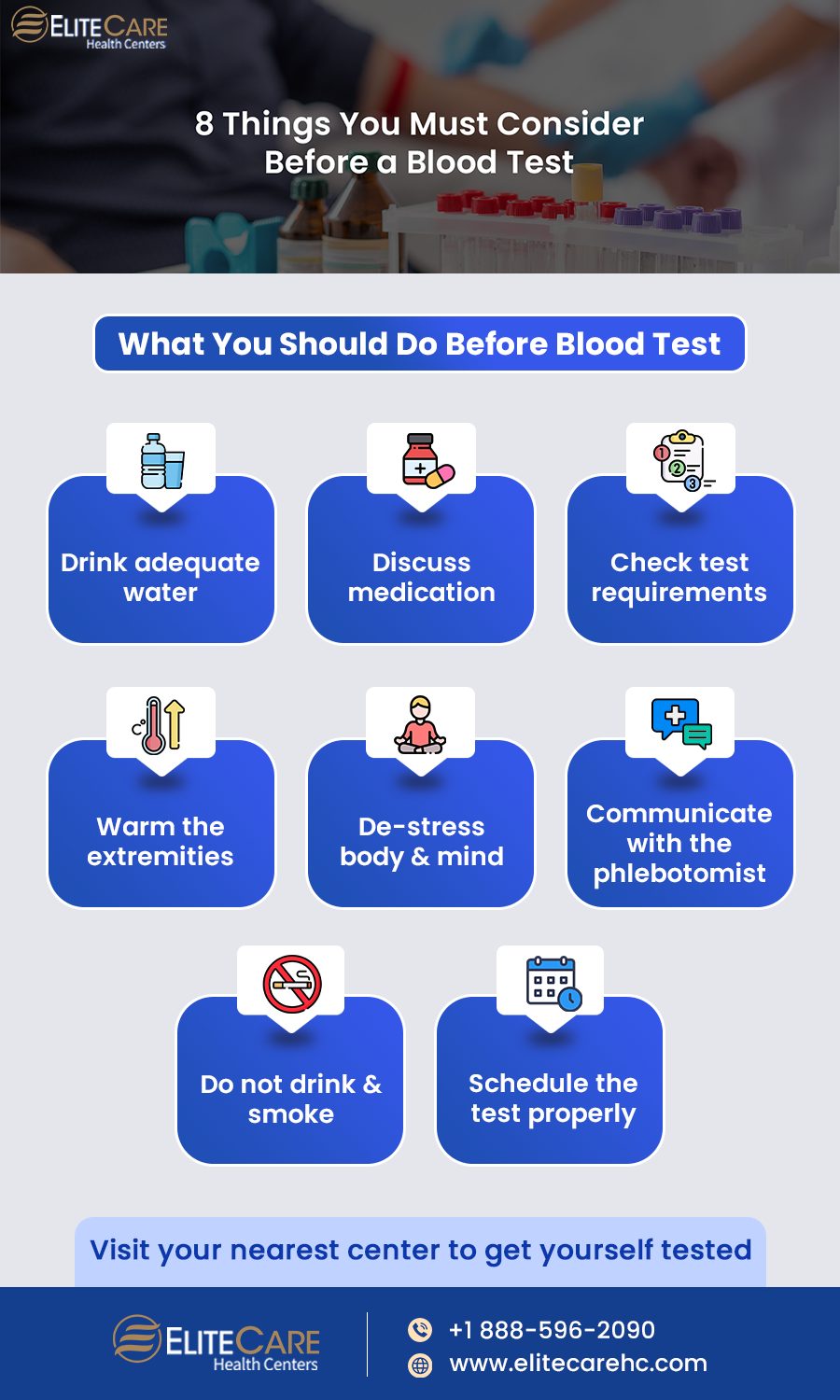
Doctors often order blood tests when they need to monitor or diagnose different health conditions. It is like a barometer for health to check the body’s health status to identify if there is any infection or if the organs are functioning properly. Blood work is essential for your health care as it gives you an insight into the effects of medications on your body.
What You Should Do Before Your Blood Test
Blood tests are a standard procedure that doesn’t come with many complications. But there are some things to consider before the test. Here is a list of 8 things you must consider before undergoing a blood test.

Drink adequate water
Before a blood draw, drink enough water to keep yourself hydrated. Blood comprises 50% of water content, so drinking plenty of water ensures the required blood concentration. Moreover, adequate hydration keeps the veins plumper and helps phlebotomists in the blood draw. However, the only exception is when the healthcare provider requests a fasting blood test to check blood sugar levels.
Discuss medication
Medications can interfere with several blood components and alter the results of a blood test. Therefore, it is especially critical for seniors suffering from multiple chronic diseases to discuss medicine dosage and any adjustments or changes needed with their healthcare provider before the test. Besides, some medications that affect blood clotting can also cause health complications.
Here are a few common medicines that can interfere with the blood test results.
- Antibiotics: Penicillin can falsely elevate blood glucose results and provide you with an incorrect reading. On the other hand, cotrimoxazole and erythromycin can affect blood clotting time and cause trouble while drawing blood.
- Antidepressants: Both antidepressants and antipsychotics can produce false positive blood pregnancy test results.
- Beta-blockers: These medicines can reduce HDL or healthy cholesterol levels and raise the level of triglycerides, a fatty acid tested for in cholesterol tests.
- Steroids: Some oral prednisolone can raise HDL, LHL, cholesterol, and triglyceride levels in your blood.
It is best to wait 24 hours or 48 hours before getting your blood drawn if you are taking any of these medications. Always consult with your healthcare provider for specific instructions.
Check test requirements
Some blood tests require you to fast. This is because food and drink can affect the composition of blood and test results. For example, if you are checking your blood sugar levels, you should not eat or drink for at least eight or ten hours before the blood draw. Foods, especially carbs, can interfere with the glucose level in the blood. Thus, always make sure to check with your doctor about the pre-test fasting requirements.
Some of the most common blood tests that require fasting are as follows:
- Fasting blood glucose
- Iron studies
- Kidney function test
- Lipid profile
- Vitamin B12
Warm the extremities
It is vital to warm up the extremity from where the phlebotomist will draw the blood. It helps increase blood flow to the area and makes the veins easy to find. You can warm the extremities by applying a heated compress over the area for approximately 10 to 20 minutes. In addition, wearing warmer clothes can also help with this procedure.
De-stress body and mind
Stress has an adverse effect on blood test results. It can increase your blood pressure and can alter the test results. Besides, it also constricts your veins and makes it difficult to draw blood. Holding your breath while the phlebotomist draws your blood can also cause fainting.
To relax your body and mind or try deep breathing exercises. You can also try talking to someone to distract yourself during the blood draw if you fear needles.
Communicate with the phlebotomist
If there are certain ways that may help the phlebotomists to draw your blood conveniently without any complications, communicate those with them. Mention any potential allergic reactions like irritation from latex used in gloves, tourniquets, and bandages that may create problems. Taking blood thinners like warfarin (Coumadin) or apixaban (Eliquis) makes it increasingly difficult for the blood to clot. Inform this so that they can put firm pressure on the gauze for at least 5 minutes to stop the bleeding. Also, mention if you have a history of feeling weak, sick, or faint during or after blood tests.
Restrict certain activities
Avoid any strenuous physical activity before a blood test. Cardio exercises, running, sexual activity, smoking, and drinking alcohol are never advisable before the test. It can compromise the result and even cause complications during the blood draw.
Schedule the test properly
It is crucial to schedule the test at the right time to obtain the right results. If you are getting a blood test that requires you to fast, such as a fasting blood sugar test, schedule the test as early in the morning as possible. The 8 hours of sleep you get at night is a part of the fasting period. In addition, make sure to have the tests done in a certified lab that has all the necessary medical equipment along with qualified phlebotomists
Takeaway
Different types of blood tests require different types of preparation. However, these are some of the most common steps you must follow to ensure the correct results. Make sure to consult your physician and follow his instructions well before getting a blood test done.






